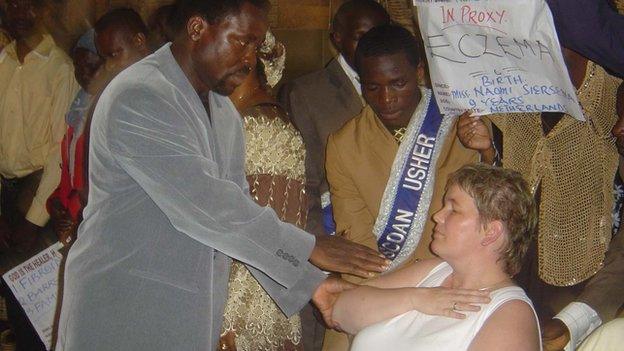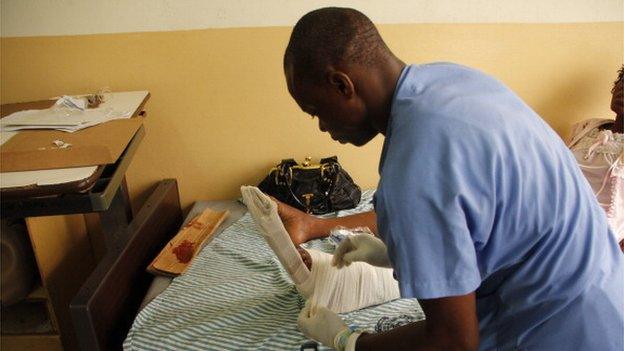Letter from Africa: Why do we rely on 'miracle cures'?
- Published
- comments

Many people, including presidents, believe TB Joshua has supernatural powers
In our series of letters from African journalists, Ghanaian writer Elizabeth Ohene, a former government minister and member of the opposition, considers why so many Ghanaians turn to supernatural powers for help.
Ours must be an advertiser's paradise. We believe in miracles and the more spectacular they are, the better.
Radio and television stations and newspapers all make a brisk business selling "miracle cures" for all ailments.
The streets are cluttered with billboards of all sizes telling us about the one-stop answer to all problems.
A current favourite of mine is an advertisement that screams at you not to die of cancer and promises that be it "prostate, ovarian, stomach, cervical, liver, lung, breast, pancreatic" or whatever variety of cancer, you are assured of a 21-day phenomenal treatment.
'Magic pill'
And while you are about it, a period of one to two months is all that is required to recover from male or female infertility, six months for full rehabilitation from a stroke or total recovery from diabetes, hypertension and hepatitis and one to three weeks for the clearance of fibroids.
And oh yes, one month is needed for total recovery from burns, no matter "the degree of burns" on your body.
.jpg)
Fetish priests and priestesses also promise to provide cures for all kinds of illnesses
The germ theory of disease has not quite taken hold among some of us yet and, probably because we prefer to attribute the source of disease to the supernatural, we provide very ripe pickings for those who peddle miracles - fetish priests, religious fundamentalists of all shades, charlatans, cynical politicians and innocent grandparents.
Since we believe that diseases come from supernatural powers, we tend to expect cures and miracles for every disease.
People simply do not accept that there are diseases that have no cures.
For example, people have difficulty coping with the concept of dealing with a medical condition like hypertension or diabetes or any condition that requires having to take medication every day or a change in lifestyle.
We want a magic pill that will cure a disease.
We do not want to put drops in our eyes every night or take medication to keep the blood pressure down.
We are in the midst of the worst cholera outbreak ever in Ghana, but there is no evidence that we are changing our personal and public hygiene habits.
We believe a miracle will come to our rescue.
'Losing value'
The claims for "miracle cures" are not limited to diseases. If you are in need of a wife, a husband or money, there must be a "magic cure" from the newest prophet and a potion to go with it.
And he will be grateful if you will tell your friends about the efficacy of his prayers and potions.
The ultimate endorsement for miracles came when Ghana's late and much-lamented President John Atta Mills ascribed his winning of the presidency in 2008 to the supernatural powers of TB Joshua, the Nigerian founder of the Synagogue, Church of All Nations.
Suddenly, this man became the answer to everybody's problems in Ghana and around the continent.

TB Joshua

Founded Synagogue, Church of All Nations in the 1990s
Runs Christian television station Emmanuel TV
The ministry professes to heal all manner of illnesses
Controversially this includes HIV/Aids
Known as the "Prophet" by his followers
Tours Africa, the US, the UK and South America

Last year, an upmarket area of Ghana's capital, Accra, where one of his churches is located, came to a chaotic halt for two days, as people scrambled to buy "holy" water he had sent.
Four people died in the ensuing melee and more than 30 were wounded.

A stampede at TB Joshua's church in Ghana last year caused casualties...

While last month the church building he owned in Nigeria collapsed
Last month's disaster at his church premises in Nigeria's main city, Lagos, when a building collapsed, showed the lengths people will go to attend a ministry professing miracles. Of the 115 people who perished, 84 had travelled from South Africa.
Normal economic theories and market forces do not quite work here either. Or at least, we do not believe they work, just as the germ theory and the management of lifestyle diseases do not work here.
We want cures, miracle cures, and the faster we get them, the better.
If we get ourselves into debt, we do not accept we have to be subjected to any austerity measures to get out of the difficulties.
If our currency is losing value, we do not expect, nor would we tolerate, any gradual measures that might lead to a reversal of fortunes.
In this land of the miraculous, just like the advertisement which promises one-month total recovery from all burns, we are expecting that all will be well with the economy by the end of the year.
But then, it helps to believe in miracles to survive in this place.